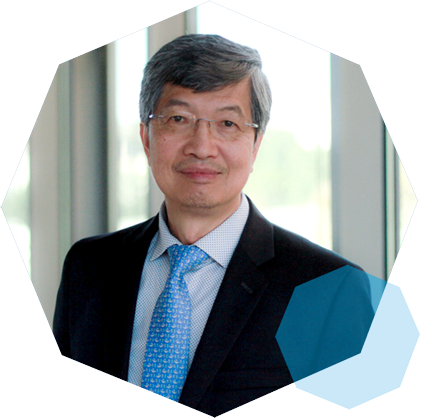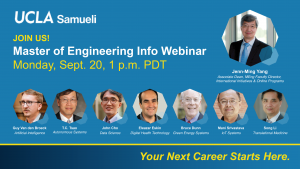
Your Next Career Starts Here.
One year  Full time
Full time  On campus
On campus
The professional Master of Engineering degree

UCLA’s one-year Master of Engineering (MEng) self-supporting, professional degree is designed to develop future engineering leaders. The degree addresses the needs of both students and industry, tailored to those who wish to pursue technical management positions, with both high-tech skill set and management savvy. The program includes an interdisciplinary technological concentration, an engineering professional development component and a capstone project.
The 2024-25 application deadline is January 15, 2024.
Admissions decision notifications will be delivered via email by March 2024 from both the Master of Engineering program and the UCLA Graduate Admissions Office. Applicants will be notified if anything is missing from their applications.

AREAS OF STUDY
Excel among a team of innovative engineers, business leaders and the UCLA network of cutting-edge technology and research labs. All areas of study involve an interdisciplinary technology concentration drawing from various departmental expertise.
Artificial Intelligence
Area Director: Prof. Guy Van den Broeck. Integrate faculty expertise from Computer Science, Computational Medicine, and Electrical and Computer Engineering. Focus on building smart machines capable of reasoning, learning and acting intelligently, and performing tasks that typically require human intelligence.
VIEW DETAILS
Autonomous Systems
Area Director: Prof. T. C. Tsao. Integrate faculty expertise from Mechanical and Aerospace Engineering, Electrical and Computer Engineering and Computer Science. Focus on recent advances including dynamic systems and controls, machine learning, optimization, and embedded and cyber-physical systems. It will also explore important autonomous system technologies including robotics, autonomous electric vehicles, transportation network, smart grids, etc.
VIEW DETAILS
Data Science
Area Director: Prof. Guy Van den Broeck. Integrate faculty expertise from Electrical and Computer Engineering, Computer Science and Computational Medicine. Focus on unifying statistics, data mining and analysis, machine learning, and distributed and parallel systems to understand and analyze large amounts of data.
VIEW DETAILS
Digital Health Technology
Area Director: Prof. Eleazar Eskin. Integrate faculty expertise from Computer Science, Bioengineering, Electrical and Computer Engineering, Computational Medicine and the David Geffen School of Medicine. Focus on digital health tools that have the vast potential to improve our ability to accurately diagnose and treat disease and to enhance the delivery of health care.
VIEW DETAILS
Green Energy Systems
Area Director: Prof. Jenn-Ming Yang. Integrate faculty expertise from Materials Science and Engineering, Chemical and Biomolecular Engineering, Mechanical and Aerospace Engineering, and Electrical and Computer Engineering. Focus on renewable energy and energy storage including energy generation (fuel cells, solar energy and other renewables), storage systems (batteries, supercapacitors and large-scale storage), and smart grid systems and grid integration.
VIEW DETAILS
Integrated Circuit Design
Area Director: Prof. C K KenYang. This course addresses the growing demand for high-performance circuits in AI, communication and emerging technologies. Moreover, it equips students with the skills to tackle the challenges posed by new devices and complex circuitry.
VIEW DETAILS
IoT Systems
Area Director: Prof. Mani Srivastava. Integrate faculty expertise from Computer Science and Electrical and Computer Engineering. Focus on the foundation needed to design, implement and fabricate systems for the “Internet of Things” — where computing, sensing, actuation and communication capabilities are embedded in and coupled with physical spaces and humans.
VIEW DETAILS
Translational Medicine
Area Director: Prof. Song Li. Integrate faculty expertise from Bioengineering, Chemical and Biomolecular Engineering, Computational Medicine and the David Geffen School of Medicine and Dentistry. Focus on improving human health and longevity by translating discoveries in biomedical sciences into disease therapies. Translational medicine facilitates the development of diagnostic tools and therapeutics, and the application of systems biology and data sciences to biomedical problems.
VIEW DETAILS

COURSEWORK FOCUS
Interdisciplinary Technology Concentration
Each technology concentration requires five engineering courses. These five courses are cross-departmental and are offered as part of the traditional master’s program.
Engineering Professional Development
Engineering professional development requires three graduate-level courses that can include technical project management, systems engineering, financial management, management communications and engineering entrepreneurship.
Capstone Project
Industry-sponsored capstone projects will enhance connections and networking opportunities vital to career development. The project will involve students working in teams to conduct hands-on design, fabrication and testing. It will integrate all aspects of degree requirements: technical, financial, management and communication.
VIEW DETAILS

“The Master of Engineering professional-degree program will develop valuable business and technology skills sets for our students — preparing them for today’s dynamic workplace as they become tomorrow’s industry leaders.”
— Jenn-Ming Yang, Faculty Director of the new MEng program and Associate Dean, International Initiatives and Online Programs

